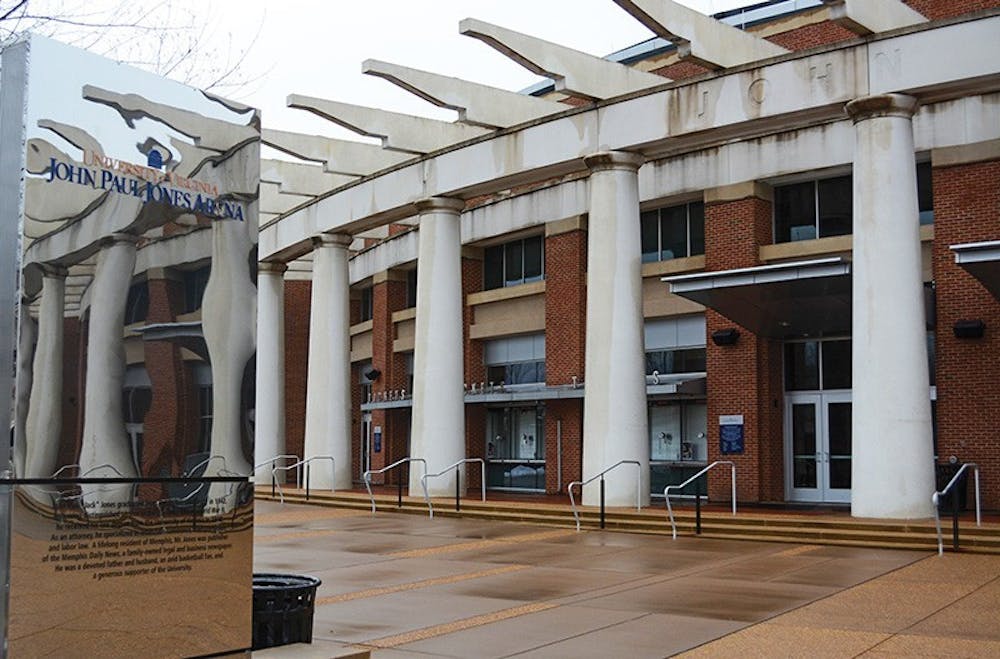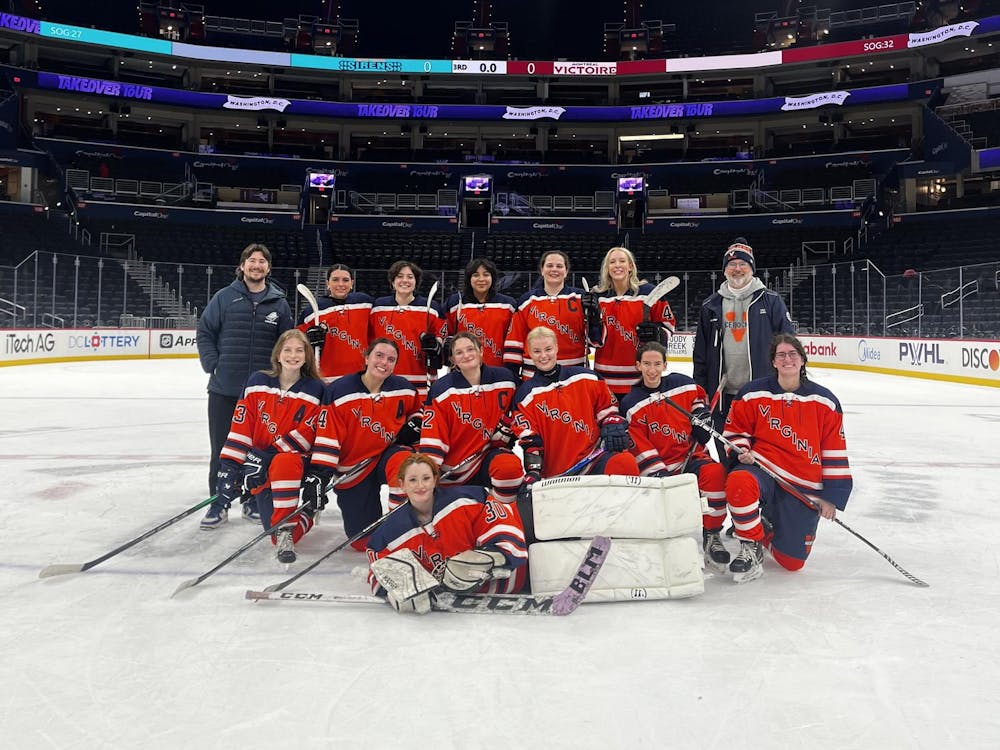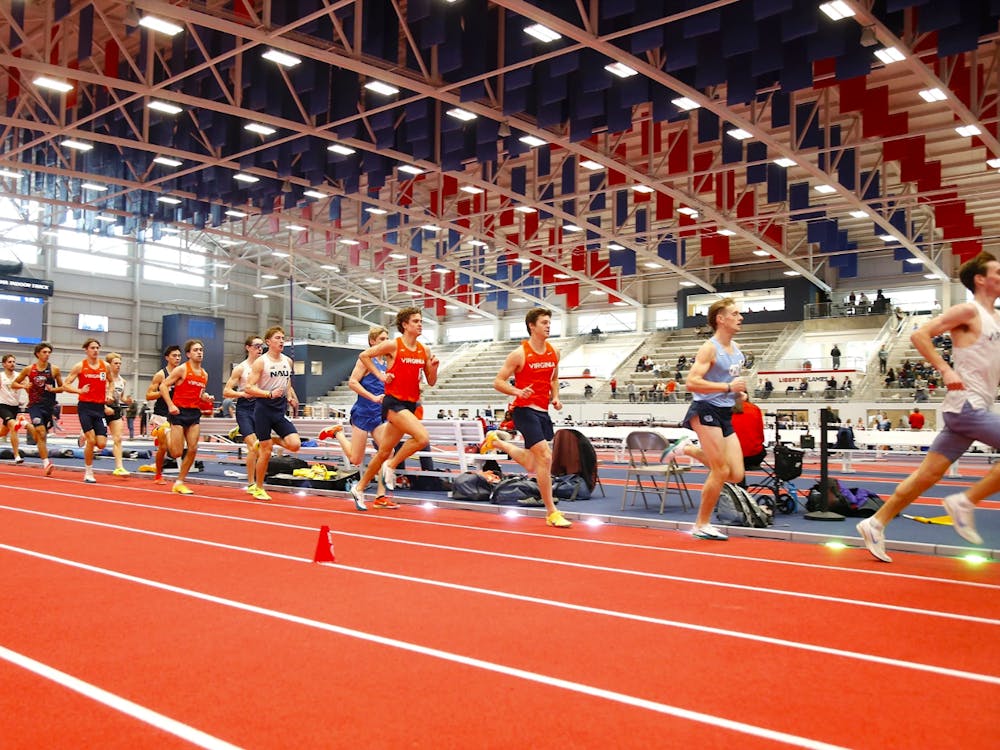When you’re sitting at John Paul Jones Arena watching the men’s basketball team play, a lot more is going into your experience as a fan than you might imagine. The Virginia Athletics Strategic Marketing and Fan Engagement department is dedicated to ensuring you are creating memories at the game and truly enjoying your time as a fan. Let’s take a deeper look at exactly how the department crafts engaging game day experiences.
Game-by-game
As soon as the schedule is released for the season, the marketing department puts together a document called a “game-by-game.” This document includes all of the information about the game — the opponent, game sponsors, promotions and more.
The marketing department meets weekly with Virginia Sports Properties — the Virginia Athletics multimedia rights holder — to discuss which sponsors are involved in each game throughout the season and where certain promotions can work.
The promotions go beyond the conventional half-court shot and include t-shirt tosses, shooting contests and on-court games that occur during game breaks. One of this season’s most successful promotions was Smithfield Bricks for Bacon, where students received coupons for free bacon if the opponent missed two straight free throws in the second half of a game.
“[It’s about] creating experiences and memories that the current crowd of students will take home with them,” said Greg Driscoll, assistant athletics director for strategic marketing and fan engagement.
Booking performances
Performances are crucial to keeping fans engaged during games. The marketing department must book a national anthem performer, a group presenting the colors and a halftime act for each game.
A cappella groups on Grounds get first access to perform the national anthem. Groups sign up on a first-come, first-serve basis and then another individual or group is booked for the slots that aren’t filled by one of the University’s many a cappella groups.
Similar to how a cappella groups perform the anathem, the presentation of the colors is typically conducted by an ROTC group on Grounds. When students are on University breaks or a group is unable to make it, the marketing department has relationships with the Charlottesville Fire Department Honor Guard, whose members fill in.
Booking the halftime acts is always a fun part of the job for Driscoll and Katie Rudy, director of event presentation and fan engagement. They find many department and fan-favorite acts through America’s Got Talent, and many performers have returned to JPJ multiple years in a row to perform in front of the crowd.
Halftime performances are also a great opportunity for youth recreational teams to sink in the atmosphere. The marketing department often invites teams from across Central Virginia to scrimmage during halftime in front of a packed house — a far cry from the elementary and middle school courts they are used to playing on.
Game day scripts
Game day scripts are a huge part of the preparation for the actual games. The script itself includes every promotion and when it will occur, each announcement and the exact words that will be read by the PA announcer, every video and when it will be played, every performer and every time slot when the band or DJ will be playing music. Everything is timed out to the second and attention to detail is key to ensuring all of the moving pieces come together.
To manage all of these pieces, the game day script is created on Shoflo — an event production software that allows for easy collaboration and editing.
The marketing department also creates another form of the game day script — the intern timeline. The department has a team of student interns that work each game to carry out the in-game promotions. To do so, they use an abbreviated version of the game day script that includes everything about the promotions the interns would need to know. Each promotion and the necessary time cues and props are included, as well as guidelines for picking contestants and individual assignments for each intern.
Game day
The work of the marketing department comes together on game day. By this time, the script is roughly finalized — though things can often change at the last minute depending on the flow of the game.
Game-day staff typically report to JPJ four to six hours before tipoff and work until the game is over. There is a video services meeting with everybody three hours before tipoff where every detail about the game is reviewed. Right after the video services meeting, a full run-through of all videos and promotions takes place. Since practice makes perfect, even if it is the last game of the season and the promotion has been done previously, the runthrough will still happen.
During the game, headset communication is key. There are typically between 10-20 people wearing a headset — video services, spotlight operators, camera operators, interns and the DJ are among some, alongside Rudy and Driscoll. Everybody on headset must work in unison to create seamless transitions between game breaks and game play.
“There is such a high level of product on the court at JPJ that we want to make the entire experience a spectacle that the fans don’t want to miss,” Driscoll said.
There are also people who are not employed by the athletics department who contribute to the game day experience created by the marketing department. Freelance camera operators give fans valuable angles of the game up on the video boards. In-game hosts Jamar Hicks and Tara Wheeler interact with promotional contestants and play a sizable role in getting the entire crowd involved in the game. DJ Ron Manila is responsible for pumping up the crowd and playing the right balance of music to please every person in the building.
Additionally, the marketing department has to coordinate with people who aren’t wearing headsets during the game. People in the department must communicate with performers, special guests and security ambassadors to ensure that everyone is where they need to be, when they need to be there.
In-season work
The marketing department is still consistently working towards improving fan experiences throughout the season, even on days where there is not a game.
Fan feedback is very important to the department, so they regularly send out email surveys to ticket buyers. By analyzing the feedback from these surveys, the department is able to gain insights into what the fans are experiencing at JPJ, what can be improved and what practices should be maintained.
The people not employed by the athletics department also put in a lot of work throughout the season. The in-game hosts have to memorize scripts days before a game so that they can seamlessly execute promotions and nail pronunciations. Manila spends many hours in the season discovering new music to play before, during and after the games. Additionally, Hoo Crew meets with department members during the season to discuss the results of promotional game themes and discover new ones.
While the marketing department typically focuses most of their efforts on regular season games, they also assist with ticket sales for the ACC and NCAA Tournaments.
After the season ends
When the season ends, the marketing department is already preparing for the next. One of the first things they do is review what went down in the season with Ronnie Wideman, associate athletics director for men's basketball administration and operations.
Wideman works with the marketing department in this meeting to recap what went well during the past season and lay out goals for the upcoming season. These goals usually include improving attendance, selling more tickets and making the game day experience more fun for fans.
In a world where it is easier, cheaper and more convenient to watch a basketball game at home, meeting these goals is difficult and requires a lot of creativity from a marketing standpoint.
“Some of it is taking a look at what other schools are doing to be successful,” Rudy said. “We take a lot of notes from things that have been done and figure out how we can tailor that to our audience and put a Virginia twist on it.”
People within the department also attend annual conferences for college athletics where they learn about new technologies and techniques that they can bring back and use to achieve their goals.
It truly takes a village to prepare for a men’s basketball game. People collaborate at every level to make sure that everyone is enjoying their experience at JPJ — whether the Cavaliers are winning or losing.
“The notion of home court advantage is very real,” Driscoll said. “Our student-athletes feed off of our energy.” During this last season, this seemed to be true, as Virginia won 14 of its 17 home games.







